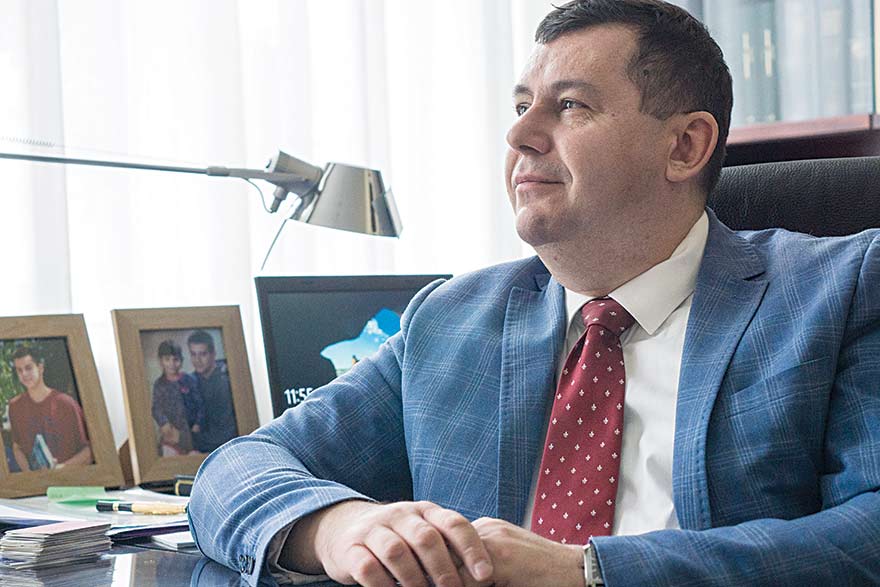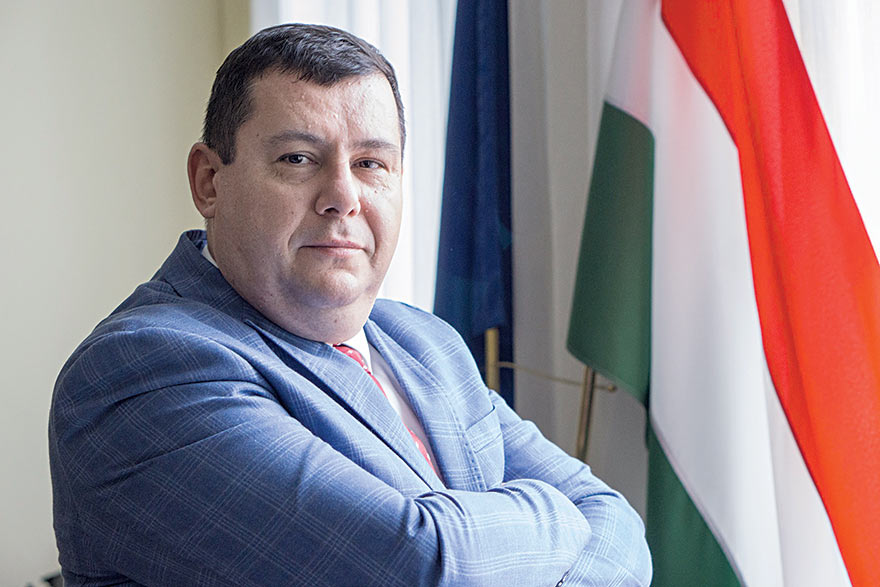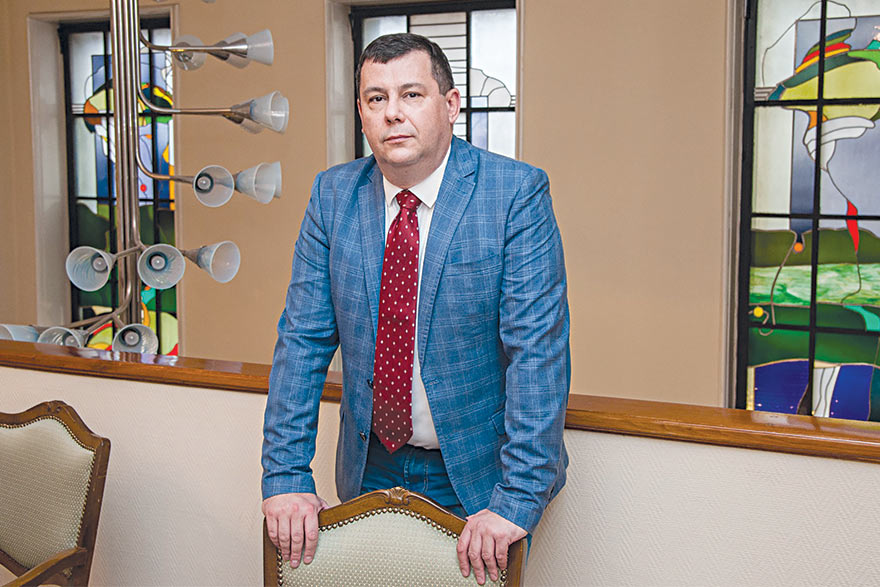Hungary – as a member of the Schengen zone – is in a special position, given that it is on the external border of the EU. This puts the burden of responsibility on us, while we simultaneously want to ensure safe and reliable transit into the EU. The opening of new border crossing stations helps the flow of people and goods and makes services more accessible to both sides. It is not just a question of trade and commerce; such developments foster people-to-people contacts as well
“Today we are facing several security challenges in the region, but I suppose the biggest one is illegal migration, which has caused a lot of problems for the countries of the Balkans,” says H.E. Attila Pintér, Ambassador of Hungary to Serbia, speaking to CorD. “However, the solution doesn’t depend on them. The other very important challenge, in my view, is energy. It is critical for the countries of the region to have cheap and ample energy sources for the sake of economic development. Without this, they may not be able to achieve the necessary GDP growth to reach the level of development of Central Europe, and later that of the Western European countries. Without significant economic development and GDP growth, these countries will face the emigration of their population, and mainly younger generations will decide to leave their place of birth.”
Your Excellency, in recent years there have been talks of a strong upsurge in bilateral relations between Hungary and Serbia. Will the final outcome of those strengthened ties be the expansion of the Visegrád Group to include Serbia, as recently suggested by PM Viktor Orbán?
The Hungarian Prime Minister is very proud of the strong bilateral ties between Serbia and Hungary, but he did not specifically mention the expansion of the Visegrád Group. The V4 seeks cooperation with countries in the region, in the Visegrád Plus format. The group gladly invites leaders from these countries to Visegrád Summits based on mutual interest, as happened in October 2019, when Serbian President Vučić was a guest of the summit in Prague.

How should we interpret the message of the Prime Minister of Hungary that the idea of connecting Central European countries “does not have to please the tired Brussels elite”?
As the Ambassador of Hungary to Serbia, I cannot give you a detailed understanding of the aforementioned phrase. These countries have embarked on politics based on common sense and sovereign rights, and they are willing to cooperate with each other regionally and within the European Union. The success of these countries is demonstrated by strong economic growth that surpassed the GDP growth rate of the Eurozone.
What are your thoughts on the comments that PM Orbán’s initiative is a call to create a so-called counterbalance of Old Europe, represented by France and Germany?
The European Union is about an unending debate concerning our common future, to which we are willing to contribute. The Visegrád Group has become a significant economic and political player in Europe in past years. We could say that this bloc is now trying to present its own ideas and concepts about the future of Europe that may – in certain aspects – differ from French and German perspectives.
The Visegrád Group has become a significant economic and political player in Europe in past years. This bloc is now trying to present its own ideas and concepts about the future of Europe that may – in certain aspects – differ from French and German perspectives
The issue of permanent accommodation for migrants who do not receive admission to countries such as Germany and Austria has been reactivated in recent weeks in Serbia. During the migrant crisis, you have mentioned “points outside the EU” where migrants should be stopped. Is Serbia part of such a plan?
The Hungarian Government’s position has not changed on the topic of migration. Prime Minister Orbán advocated in 2015 to provide backing to countries outside the EU that are located along the migrant routes, in order to provide aid in managing the migrant crisis on the frontlines. Furthermore, in order to address the situation at its roots, the Hungary Helps programme was launched to provide assistance to victims of humanitarian crises and persecuted communities, with special attention paid to Christians and other religious groups. Its main purpose is to contribute to Hungary’s international efforts to eradicate the root causes of migration through direct, locally-focused aid to support people remaining in their home countries.

The problem is that the migration influx remains uncontrolled and largely illegal. This phenomenon of illegal immigration threatens the stability and identity of European nation-states; while it furthermore creates security threats and raises criminal activity within the EU, and places a huge burden on the social systems and, thus, the economies of the EU.
Another border crossing opened between Hungary and Serbia at the end of last year, Rabe-Kübekháza in the municipality of Novi Knezevac. What is its significance?
The Hungarian Government has expressed its intention to make the legal crossing of borders easy and widely accessible. The Kübekháza- Rábé station is the fourth new border crossing point that opened in recent years, and more will follow. Hungary – as a member of the Schengen zone – is in a special position, given that it is on the external border of the EU. This puts the burden of responsibility on us, while we simultaneously want to ensure safe and reliable transit into the EU. The opening of new border crossing stations helps the flow of people and goods and makes services more accessible to both sides. It is not just a question of trade and commerce; such developments foster people-to-people contacts as well.
The Budapest-Belgrade railway modernisation continues to be one of the most significant infrastructure development projects in the Central European region. Considering the immensity of the investment, due care and diligence is paramount, i.e., it must be in the best interest of all participants
The long-announced project for the modernisation of the railway from Belgrade to Budapest is still not completed. When will the work start on the Hungarian side and how realistic is it for all works to be completed in five years?
The Budapest-Belgrade railway modernisation continues to be one of the most significant infrastructure development projects in the Central European region. Considering the immensity of the investment, due care and diligence are paramount, i.e., it must be in the best interest of all participants. Fortunately, cooperation between the partner countries is excellent and relies on mutual respect and determination to create a corridor of international significance. The Hungarian section of the respective rail line will be built by a Hungarian-Chinese consortium and the construction is scheduled to start in the first half of 2020 and to be completed within five years.
The refurbishment of the 350 km railway line between the two capitals will result in an impressive decrease in the travel time for passenger trains (total travel time to be less than three hours), and will offer the fastest freight route between China and Western Europe via the Greek ports. The investment will have a substantial impact on the geopolitical position of both Hungary and Serbia, and also on the development of trade routes along which goods are transported into Europe.
China is a partner to Hungary and Serbia in rail revitalisation. Can this investment create problems for both countries in Brussels, since Hungary is a member state and Serbia is a candidate for EU membership?
For an investment of this magnitude, due diligence and legal compliance is a must. Hungary, as a member state of the EU, is subject to both national regulatory regimes and existing EU obligations. In this sense, if the rigorous implementation of all national and EU regulations are ensured, then choosing the best financial instrument and implementing partner is a technical question.
China is a strategic partner of both Hungary and Serbia, and its dominance and expertise in the field of infrastructure development is unquestionable. For a strategic project like the modernisation of the Budapest-Belgrade railway, China is the rational choice.
Hungary has always been an advocate for the earliest possible accession of the Western Balkan countries, especially Serbia. We contribute to this goal not through rhetoric, but through effective political and technical assistance
In recent talks with European Integration Minister Jadranka Joksimović, you reiterated your support for Serbia on its path towards EU membership. Do you share in the hope of your compatriot, EU Enlargement Commissioner Oliver Várhelyi, that at least one Western Balkan country might be ready for membership by the end of his term?
I am very pleased that a new member of the European Commission responsible for enlargement expressed such high hopes regarding the accession of the Western Balkans. It is important to share positive messages as the enlargement procedure of the region steps into the next stage with the new methodology.

However, this is not an unexpected development, as the Commission forecasted similar deadlines earlier for frontrunners like Serbia, and now this approach receives bolder political support. Hungary has always been an advocate for the earliest possible accession of the Western Balkan countries, especially Serbia. We contribute to this goal not through rhetoric, but through effective political and technical assistance.
You served one of your mandates in Skopje. Do you believe that North Macedonia and Albania should initiate EU membership negotiations?
Yes, of course. If a candidate country has fulfilled conditions for launching accession talks, then the EU must fulfil its promises in return.
Finding a lasting solution in the name issue between Skopje and Athens was a prerequisite for Skopje to become a full-fledged member of NATO.
I know very well how difficult it was for the citizens to accept the new name of their country, but they signed that agreement for the sake of stability for their country and the region. NATO has reacted by inviting Skopje to become a member of the alliance. The efforts exerted by the governments and peoples of the region must be respected in a similar manner by other organisations and countries.
| CHALLENGES
China is a strategic partner of both Hungary and Serbia, and its dominance and expertise in the field of infrastructure development is unquestionable |
PARTNER
The new Commission is trying to tackle climate change, biodiversity loss and pollution as integrated challenges. Such an approach will make an enormous difference |
MESSAGES
It is important to share positive messages as the enlargement procedure of the region steps into the next stage with the new methodology |
|---|